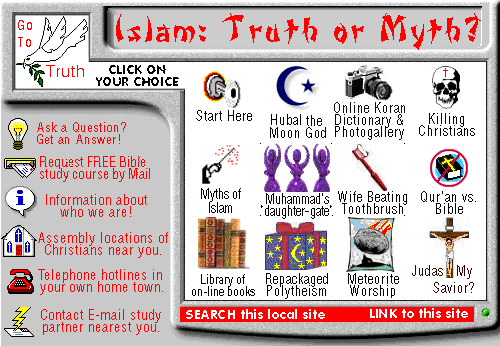Muhammad's call to prophethood and the influence of his wife
It is interesting that two other heresies, modern Pentecostalism, (neo-Monanism, 1906 AD.) and Monanism (150 AD) began with the influence of women. In fact the many cults began with the directly influence of woman who claimed inspiration themselves, or assured another they were a prophet. The devil was at work in the 7th century, when Muhammad's wife, Khadijah, "became convinced, even before Muhammad" that he was a prophet and even "reassured him". As if a prophet of God need reassurance from anyone else! Such is never found in the Bible! Islam, therefore, is founded by a man (Muhammad) who had to be convinced by a woman, that he was a prophet. If he was a real prophet of God, miracles would have been performed at his hands as proof. Not some wishful thinking spouse who perhaps confused an easily diagnosed medical condition (Epilepsy) for prophethood. For example, Ellen G. White, woman founder of the Seventh-Day Adventist church, had a brain injury as a child that induced Epilepsy through out her life. Her followers, like Muhammad's, thought she was under God's prophetic influence when she would have an Epileptic fit. How easily the ignorant are deceived! Neither Ellen White or Muhammad ever performed miracles. They did perform "feats of Epilepsy".
Quotes:
- "The first convert was Muhammad's wife, Khadijah. She became convinced, even before Muhammad, that he was indeed a prophet
." (Islam, Isma'il R. Al Faruqi 1984, p13-14, Muslim)
- "When the very first Revelation "Recite in the name of thy Lord who created" came to the Prophet in a very strange and awe-inspiring form, ' the Prophet who had never experienced such a thing before, naturally got panic-stricken. He lost all self-confidence; he was uneasy, nervous, and distressed. In short he himself did not know how he should understand this strange experience. His wife Khadijah not only reassured him, but sought stronger reassurance for him from an authority. This authority was her cousin, the very famous. Waraqah b. Naufal b. Asad. Here is the text of the main part of the story as it has been handed down to us by, al-Bukhiri: "Then she (i.e. Khadijah) took him to Waraqah b. Naufal b. Asad b. Asad al-'Uzza, her cousin. Now this man who had been converted to Christianity in the days of paganism was thoroughly conversant with Hebrew and had made a copy of a considerable portion of the Evangel in Hebrew. He was at that time a very old man and had already lost his eyesight. Khadijah said, 'O my cousin, listen to the son of your brother'. Waraqah asked him, 'Son of my brother what have you seen?' Thereupon the Apostle of God told him about what he saw." There is no positive reason for doubting the authenticity of this tradition; on the contrary, the very occurrence of the word namus, which is evidently non-Koranic, instead of the common Koranic term tawrat (Torah) argues very strongly for its authenticity and genuineness. The word namus, which is indeed the pivotal point of the story, is clearly the Greek nomos for law i.e. the exact equivalent of the Hebrew Torah. In any case the story tells us that Waraqah who was well-known for his Christian religion and his good knowledge of Hebrew scripture as soon as he heard from Muhammad what had happened to him, identified this apparently strange experience of Muhammad as something authentic belonging to the tradition of the Judeo-Christian monotheism." (God and Man in The Koran, Toshihiko Izutsu, Chapter 4: Allah, p96-119, 1980)
Written by Brother Andrew

Go To Start: WWW.BIBLE.CA

